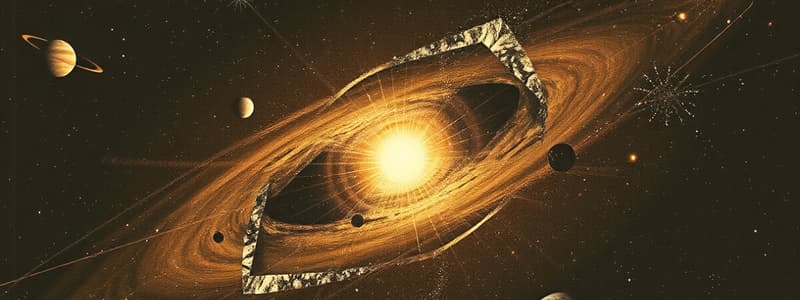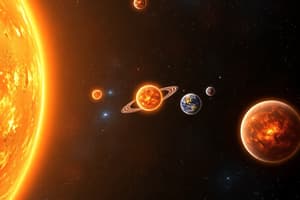Podcast
Questions and Answers
The ____ of a star will determine its lifespan.
The ____ of a star will determine its lifespan.
mass
Many stars are classified in terms of brightness, or?
Many stars are classified in terms of brightness, or?
magnitude
Select the pair of bodies which are most alike in composition and size.
Select the pair of bodies which are most alike in composition and size.
- Earth and Venus (correct)
- Earth and Mars
- Comets and Asteroids
- Jupiter and Saturn
Which of these list bodies in order, from closest to furthest from the Earth?
Which of these list bodies in order, from closest to furthest from the Earth?
The process that fuels a star is best described as?
The process that fuels a star is best described as?
The raw materials that formed the solar system were most likely?
The raw materials that formed the solar system were most likely?
The force that caused the solar system to form large clumps is?
The force that caused the solar system to form large clumps is?
The main difference between terrestrial planets and gas giants is?
The main difference between terrestrial planets and gas giants is?
During the earliest stages of the universe, the only things that existed were?
During the earliest stages of the universe, the only things that existed were?
What should the graph from Step 6 look like?
What should the graph from Step 6 look like?
What keeps the Earth from being pulled into the Sun?
What keeps the Earth from being pulled into the Sun?
A meteorite is different from a comet mainly because it?
A meteorite is different from a comet mainly because it?
The bright, looping projection extending from the surface of the Sun is called?
The bright, looping projection extending from the surface of the Sun is called?
What could be the reason astronomers in the early 20th Century thought the Milky Way was the entire universe?
What could be the reason astronomers in the early 20th Century thought the Milky Way was the entire universe?
All but one of these is a reason why life is found only on Earth. That is?
All but one of these is a reason why life is found only on Earth. That is?
Luminosity of a star depends on which two factors?
Luminosity of a star depends on which two factors?
What two factors keep Earth in orbit around the Sun?
What two factors keep Earth in orbit around the Sun?
What evidence did Galileo find observing Jupiter's moons?
What evidence did Galileo find observing Jupiter's moons?
Which planet will take the longest amount of time to orbit the Sun?
Which planet will take the longest amount of time to orbit the Sun?
Flashcards are hidden until you start studying
Study Notes
Lifespan and Classification of Stars
- The mass of a star influences its lifespan significantly.
- Stars are classified by brightness, referred to as magnitude.
Planetary Comparisons and Structures
- Earth and Venus share similar composition and size.
- Distances from Earth to celestial bodies can vary; our position is closer to the Milky Way's edge than its center.
- The solar system formed from hydrogen gas and dust due to gravitational forces creating clumps that gave rise to the Sun and planets.
Composition Differences
- Terrestrial planets have a higher density compared to gas giants.
Early Universe Composition
- Initially, the universe was composed solely of helium and hydrogen.
Gravitational Forces in Orbit
- The graph illustrating the relationship between mass and gravitational force shows that greater mass results in greater force.
- Earth's sideways motion, alongside the Sun's gravity, prevents it from spiraling into the Sun.
Meteorites and Celestial Phenomena
- Meteorites differ from comets in that they enter the Earth's atmosphere.
- Solar prominences are large, bright projections from the Sun's surface and can persist for several months.
Historical Misconceptions
- Early 20th Century astronomers misunderstood the nature of spiral galaxies, mistaking them for nebulae due to their distant, cloud-like appearance.
Conditions for Life on Earth
- Earth uniquely supports life primarily due to its gravity, which retains a stable atmosphere.
Luminosity of Stars
- A star's luminosity, or energy emission, depends on its surface area and temperature, spanning a spectrum from radio waves to gamma rays.
Forces Maintaining Orbits
- Gravity and inertia are the two primary forces maintaining the Earth in its orbit around the Sun and the Moon around Earth.
Astronomical Discoveries
- Galileo was a pioneer in using telescopes for astronomy, revealing that Jupiter has four moons, which change positions, providing evidence of planetary size and composition variations.
Orbital Periods of Planets
- Uranus has the longest orbital period around the Sun compared to other planets.
Studying That Suits You
Use AI to generate personalized quizzes and flashcards to suit your learning preferences.




